2 Line Afsos Poetry, Urdu for “regret” or “sorrow,” forms the heart of a unique poetic tradition. Within this realm lies a captivating format – the two-line Afsos sher (couplet).
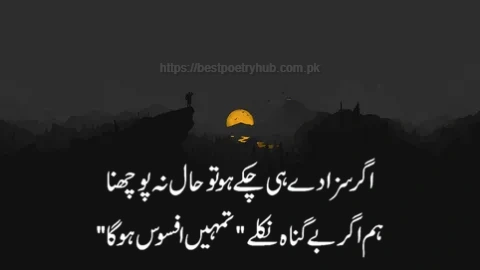
Agar Saza De Hi Chuke Ho to Haal Na Poochna
Hum Agar Begunaah Nikle “Tumhain Afsos Hoga”
These concise verses, though seemingly simple, pack a powerful punch, encapsulating profound emotions within a mere 14 syllables.
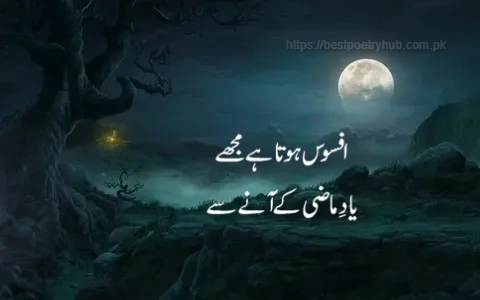
Afsos Hota Hy Mujhe …
Yaad-e-Maazi K Aane Sy
This article delves into the world of 2-line Afsos Ravayya in poetry, exploring its history, structure, and the evocative power it wields.
رخسار نم، کٹھن لہجہ اور آواز مدہوشی
بچھڑنے کا منظر تم کو کیسے بتائیں؟
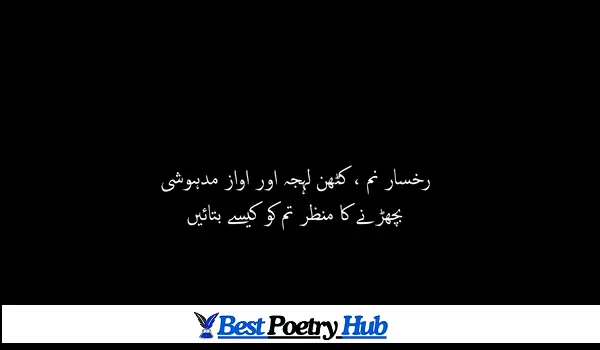
Rukhsaar Namm, Kathin Lehja Aur Awaz-e-Madhoshi
Bicharnay Ka Manzar Tum Ko Kesy Batayen?
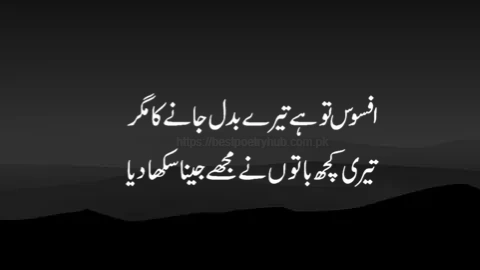
Afsos To Hy Tere Badal Jane Ka Magar . . .
Teri Kuch Baaton Ne Mujhe Jeena Sikha Diya
=======================================
کس سے کریں گلہ، کس کو حال دل سنائیں
اب کی بار بتاؤ کس کا ظرف ہم آزمائیں
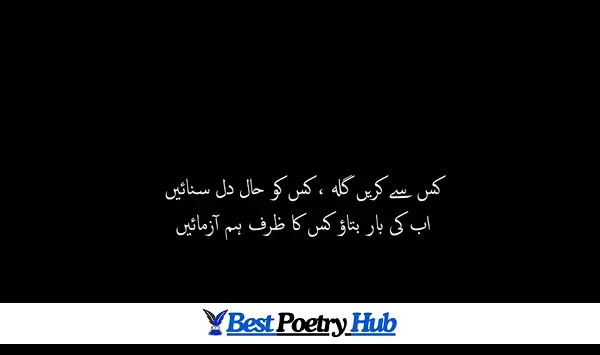
Kis Sy Krain Gilaa? Kis Ko Haal-e-Dil Sunayen?
Ab Ki Baar Btao Kis ka Zarf Hum Aazmayen
Afsos Lehja poetry finds its roots in the rich tapestry of Urdu literature, flourishing during the Mughal era (1526-1857). Urdu itself, a blend of Persian, Arabic, Hindi, and Turkic languages, embodies a natural lyricism that lends itself beautifully to poetic expression.
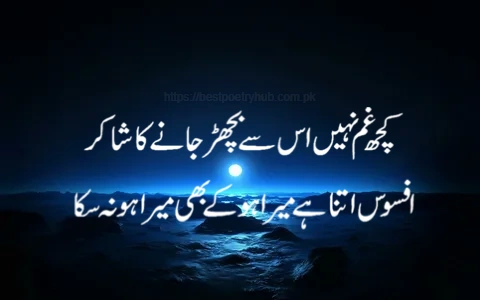
Kuch Gham Nahi Uss Se Bichar Jane Ka Shaakir
Afsos Itna Hy Mera Ho k Bhi Mera Ho Na Sakaa
Afsos shers rose to prominence as a vehicle for conveying a range of emotions, particularly those tinged with melancholy, longing, and unfulfilled desires.
پلکیں نہ جھپکیں کئی روز بعد دیکھنے کے
نثار کر رہا تھا جو وہ رقیب پر ادائیں۔۔
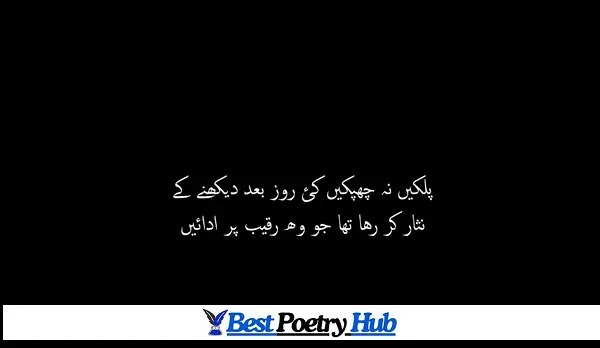
Palkain Na Jhapkeen Kayi Rooz Baad Dekhnay K
Nisaar Kar Raha Tha Jo Woh Raqeeb Par Adaayen
==============================================
سنبھالے نہ گئے آنسو، منظر ہوا نقش دل میں
جو پتھر تھا میرے لیے، ھوا کسی کا گلستان تھا
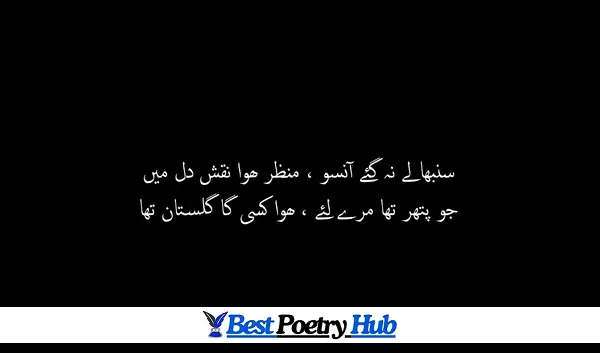
Sambhay Na Gaye Aansoo, Manzar Hua Naqsh Dil Main
Jo Pathar Tha Mere Liye, Hua Kisi Ka Gulistaan Tha
The first line often sets the scene, introduces a character, or establishes a situation. The second line delivers the poignant punchline, expressing the Afsos – the regret, sorrow, or yearning.
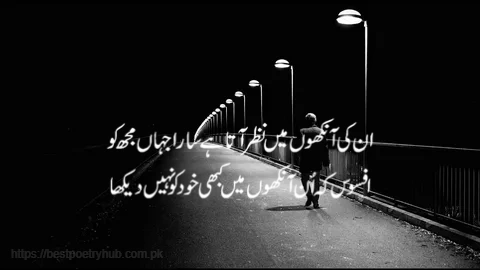
Unki Aankhon Main Nazar Aata Hy Sara Jahan Mujh Ko
Afsos K Unn Aakhon Main Kabhi Khud Ko Nahi Dekhaa
Despite their brevity, 2 Line Afsos Poetry Love possess a remarkable capacity to convey a vast spectrum of emotions. Here are some prominent themes explored in this poetic form:
Lost Love:
2 Line Afsos Poetry In Urdu frequently lament the pangs of unrequited love, separation, or heartbreak. A simple line like “Milte hi juda ho gaye, kis kis se shikayat karein?” (We met and parted ways, who do we even complain to?) captures the essence of a fleeting connection.
خواب غفلت سے ھو کر بیدار خیال
ھوا میں بہت پریشان تھا

Khwaab-e-Ghaflat Sy Ho Kar Bedaar Khyaal
Hua Main Bohat Preshan Tha…
==============================================
تم تیر نظر کرنا، ہم خون جگر کریں گے
تم ذرا حد تو کرو، ہم بے حد کریں گے
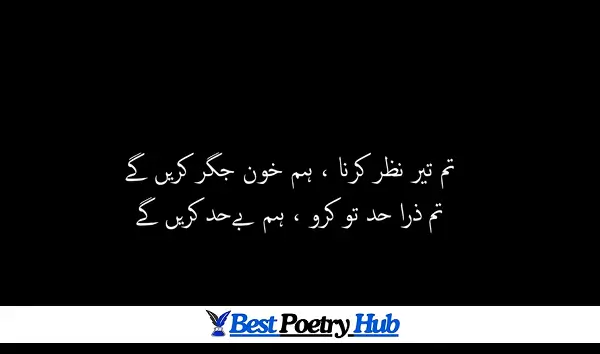
Tum Teer Nazar Karna, Hum Khoon Jigar Karain Gy
Tum Zraa Hadd To Karo, Hum Behadd Krain Gy
==============================================
دیکھ کر خواب نم روز، کرے آرزو ہر روز
دل ناداں نہیں وہ تیرا، سمجھتے کیوں نہیں ہو تم
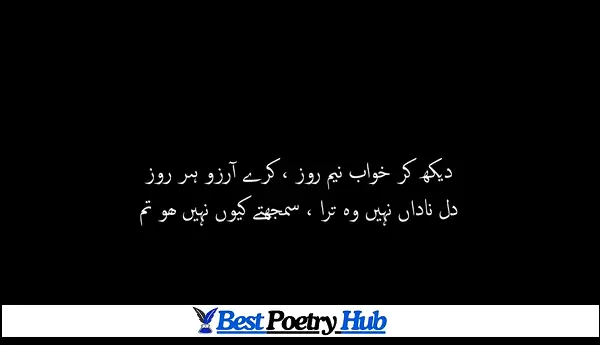
Dekh Kr Khwaab Nam Roz, Karay Aarzoo Har Roz
Dil Naadan Nahi Woh Tera, Samjhty Nahi Ho Tum
The Passage of Time:
The transience of life is another recurring theme. A sher like “Woh lamha laut aata to kuchh kehna tha usko, Phir bhi dil ko dharkan dete hain guzre हुए mausam” (If only that moment could return, I had something to tell them, Even the bygone seasons make my heart flutter) reflects on missed opportunities and the bittersweet nature of memories.
ستم ظریفی کا کیا دل کرنے کو سجدہ جسے
وہ بھی تو بھلا اک انسان تھا۔۔۔
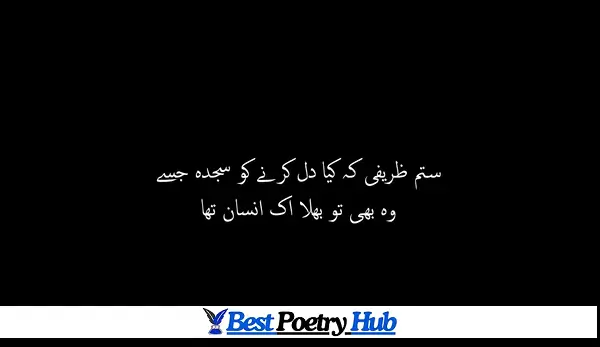
Sitam Zreefi K Kia Dil Karnay Ko Sajdah Jissay
Woh bhi to Bhlaaa Ik Insaaan Thaa…..
==============================================
اس روز تو قیامت ھوگی، انھیں احساس ندامت ھوگی
پھٹے گا کلیجہ کرکے خیال، کہ تڑپتے ھوگے تم
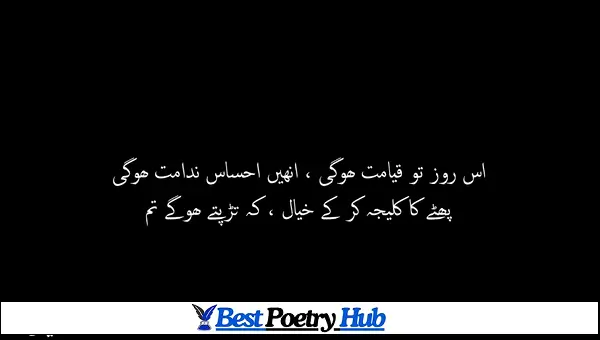
Uss Roz Qayamat Hogi, Unhain Ehsaas Nadaamat Hogi
Phtay Ga Kalaja Kar K Khyaal, Ko Traptay Hogay Tum
Yearning for Unfulfilled Dreams:
2 Line Afsos Poetry Attitude is also a canvas for expressing aspirations that remain unrealized. “Sapno ki basti mein kho gaye hum, hakikat se door reh gaye” (Lost in the city of dreams, we stayed far from reality) exemplifies this theme, highlighting the bittersweet contrast between hope and reality.
تیرے ٹھکرا کر چلے جانے کے بعد ہی کیوں
دل کم بخت ہوا بہت ویران تھا
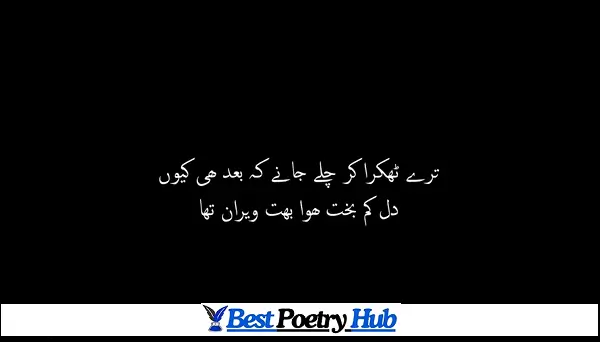
Tere Thukraa Kr Chalay Janay K Baad Hi Keun
Dil Kam Bakhat Hua Bohat Veeran Tha…
==============================================
دیکھ کر مجھے یہ جو ہنستے ھو بہت تم
بدنام کرکے چارہ گر جو ترستے ھو بہت تم
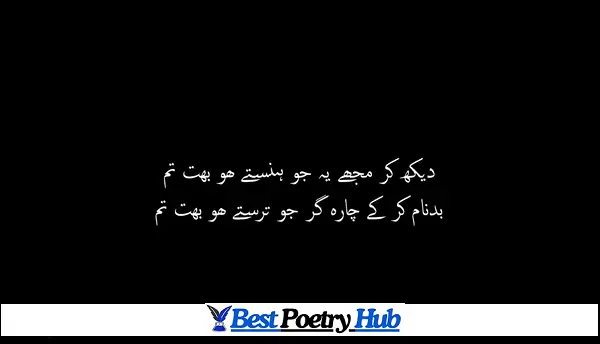
Dekh Kr Mujhe Yeh Hansty Ho Bohat Tum
Bandaam Kr K Chara Gar, Jo Tarsty Ho Bohat Tum
The Inevitability of Loss:
The impermanence of life and the inevitability of loss find voice in 2 Line Afsos Poetry English. “Zindagi khel tamasha ban gayi, har pal badalte hain mausam” (Life has become a mere spectacle, the seasons change with every moment) reflects on the ever-shifting nature of existence.
رلا کر مجھے اشک لہو، پامال کیئے میری آبرو
کھڑے ھو ایسے جیسے فرشتے ھو تم
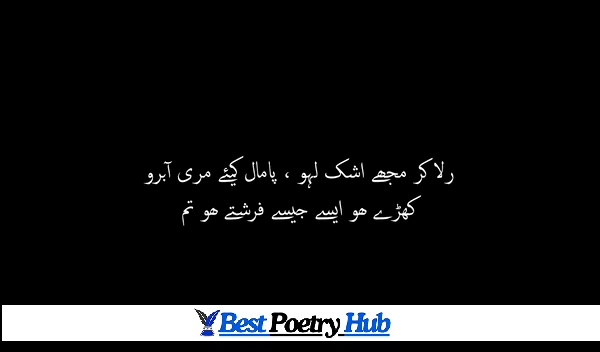
Rulaa Kr Mujhe Ashk-e-Lahoo, Pamaal Kiye Meri Aabroo
Khary Ho Aisy Jesay Frishtay Ho Tum…



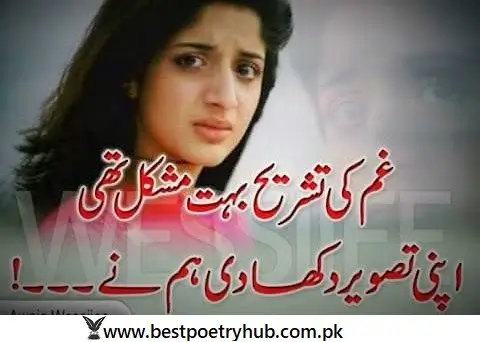

One thought on “2-Line Afsos Poetry With Roman Text on Images 4 DP Now”